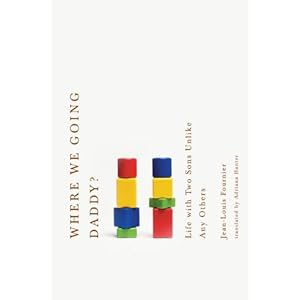--The blurb--
"Jean-Louis Fournier did not expect to have a disabled child. He certainly did not expect to have two. But that is precisely what happened to this wry French humorist, and his attempts to live and cope with his Mathieu and Thomas, both facing extremely debilitating physical and mental challenges, is the subject of this brave and heartbreaking book. Fournier recalls the life he imagined having with his sons—but his boys will never really grow up, and he mourns the loss of every memory he thought he’d have.
Though a devoted father, he does not shy away from exploring the limits of his love, the countless times he is filled with frustration and disappointment with no relief in sight. Mathieu and Thomas can barely communicate, and each in turn repeats learned phrases, such as “Where we going, Daddy?” (a favorite in the car) in what feels to Fournier to be an eternal loop."
--The review--
Having read Fournier's wry and sardonic God's CV, I had a little soupçon of what I thought I could expect from Where We Going, Daddy? However, even when reading it in French (under which it is published as Où on va, papa?), which is not my native language, I was hit with the full force of the emotion and surprise that Fournier packs into this short work, a fiction/non-fiction hybrid, with which to move his readers. And deeply moving it indeed is: perhaps too sentimental for some, Fournier explores all aspects of life as a parent of disabled children, from what happens when they are old enough to vote to how you feel when you think the au pair has done what you sometimes feel like doing and thrown them out of the window.
This little overview of the situations covered shows what Fournier is like as a writer; as well as having the potential to move you, he also has the potential to appall and shock you, dispensing black humour at the most unexpected turns in the road. He reveals unflinchingly his perceived failings as a parent and as a human being, and does not make a secret of his use of jokes to help keep him sane and in some small way to make fun of himself. But in spite of the sense of gallows humour exhibited here, Where We Going, Daddy? is ultimately a tale of the heart-rending variety. It is not in the least cheery and does not seek to be cheesy or inspirational, American-style. It is perhaps self-pitying in places, but as someone without disabled children, you think to yourself: but wouldn't you be, too? Those who manage to rise above such a situation and be relentlessly positive in the face of it are likely few and far between; I would imagine that a greater majority of parents of disabled children feel what Fournier expresses here. It is an assumption, to be sure; but this novella almost certainly delivers a much-dodged insight into the lives of these parents, and thus makes a valuable contribution to the world in enabling greater understanding. Immediately you are inside Fournier's mind and life.
While delivering risky literature in his tone, topic and approach, Fournier also delivers readable literature: there are no chapters as such, but the segments and anecdotes are short, allowing full reflection on each before moving on. While short, it is a book you can take your time over as the subject matter weighs heavily on your mind and heart, thus changing you.
The one question left for me as a reader was the marginalised topic of Fournier's other child, his 'normal' daughter Marie. We are given little or no indication as to how this affected her, or indeed Fournier's wife and the mother of the three children. The book is undeniably self-centred in this regard, but equally this is the source of its impact.
Laden with linguistic devices such as metaphor and repetition, this book is not difficult to read, but rather is strangely compelling as it lays out its images in easily understandable ways. While the narrative is not finished, this is an appropriate way to stop: life, too, for all of us, albeit in very different ways to Fournier, is also often messy, unfinished, and unexplained in its alleged dispensations of justice. It is parents of the disabled who perhaps feel this most keenly. Important to remember too, though, is that this is Fournier's experience - he is not trying to generalise the experience of all parents with disabled children, but if he manages to resonate with a few, he will have done well. And equally, if Fournier's book incites even one person to change their attitude towards disabled people, he has done his job and left his mark on the world. With this being his first and so far only work to have been translated into English, it is hoped that more will follow and that his literary and social influence will continue to spread far and wide.
Other works by Jean-Louis Fournier
Poet and peasant/Poète et paysan (2010)
Blasted God!/Satané Dieu! (2005)
Little Meaulnes/Le Petit Meaulnes (2003)
I'm Not Going To Hell/J'irai pas en enfer (2001)
The Dark Girl/La Noiraude (1999)
My Dad Never Killed Anyone/Il a jamais tué personne mon papa (1999)
I'll teach you to be polite, little idiot/Je vais t'apprendre la politesse, p'tit con (1998)
God's CV/Le CV de Dieu (1995)
First three Chapters....
16 years ago






No comments:
Post a Comment